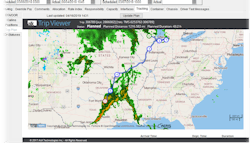DENVER. Carrier planners, dispatchers, driver managers, and the actual drivers have a new way to interact and manage each trip from before it starts until the load arrives with McLeod Software’s LoadMaster Trip Management.
The tool debuted in LoadMaster 19.1 this summer and was unveiled officially at the McLeod Software User Conference 2019 on Aug. 26, at the Gaylord Rockies.
The product was developed in partnership with Trimble Maps to “help your drivers plan better and make better use of the available amount of time they’ve got to drive,” Tom McLeod, the McLeod Sofware CEO and president, said during his conference opening remarks.
Using a driver’s HOS and position information, a trip plan is created and displayed in LoadMaster.
While the FMCSA announced earlier this month that it is considering changes to the hours-of-service (HOS) rules, those changes could take a while to be approved and implemented. And still, drivers’ available time will continue to be “a main asset” for carriers, McLeod said.
“It considers, during the planning phase, the hours of service and the required breaks,” McLeod said. “It considers fuel stops that would be required and it considers historical traffic patterns… It is very helpful to the driver in terms of efficiency. Once the load is en route, we are monitoring real-time traffic, we’re monitoring weather events and we’re keeping track of ‘out of route’ for proactive notification of the driver.”
Trip Management allows customers to enhance the accuracy of real-time ETA at customer stops and actual arrival time at locations, giving the planners and driver managers the ability to proactively deal with any potential service incidents at future stops.
This data feeds McLeod's ETA/Out-of-Route module to let the carrier know when trucks are running late for scheduled stops or when they are out of their recommended routes. This information can also be used with our existing Driver Feasibility functions to enhance the accuracy of planning, by helping planners calculate the driver’s physical ability to make the load schedule. McLeod’s Driver Feasibility determines whether the load can be physically completed based on the driver’s current position, the distances involved, the appointment windows for pick-up and delivery, and that driver’s available HOS to complete the trip. Both of these aspects are calculated and evaluated instantly for LoadMaster users to create a plan for the driver and the trip.
By accounting for different types of events, rest breaks, delays, detention, and rerouting, carriers can generate a significantly better dispatch trip plan, according to McLeod. The Trip Management module also gives the driver the opportunity to be part of the planning process. This two-way input on the plan can improve driver management before and during a loaded trip.
“Anybody where ETA and on-time delivery is crucial for the customer you’re serving, this is a part of the system that will prove very valuable,” McLeod added.
About the Author
Josh Fisher
Editor-in-Chief
Editor-in-Chief Josh Fisher has been with FleetOwner since 2017. He covers everything from modern fleet management to operational efficiency, artificial intelligence, autonomous trucking, alternative fuels and powertrains, regulations, and emerging transportation technology. Based in Maryland, he writes the Lane Shift Ahead column about the changing North American transportation landscape.

